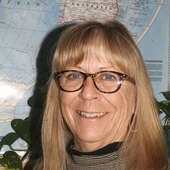- Research tips and McCook Brick Company- solid as a brick (12/16/24)
- Big Give appreciation and some railroad characters (11/15/24)
- George Randel becomes a landowner, gets married, and takes in a Buffalo Bill show (9/20/24)
- The memoirs of George F. Randel, early settler of Red Willow County (9/12/24)
- Vietnam War Memorial honors Nebraskans who served (6/13/24)
- McCook business promotions - just prior to 1893 stock market crash (5/30/24)
- Shall we dance? Meet you at the Gayway (12/8/23)
Strong women: Walking the talk
Friday, May 18, 2018
When I look back at the blessings in my life, and there are many, one that comes to mind over and over is the fact that I grew up surrounded by strong women: my mother, grandmothers, aunts, cousins and my sister didn’t just talk the talk, they walked it every day.
Their influence is even more impressive when you think about the fact that both of my grandmothers and my mom came into this world before women were even allowed to vote in the United States. Perhaps that is why my mother never missed a chance to vote and gladly served during the elections, it was a privilege to her as it should be to everyone.
The women of New Jersey voters in 1776 and in fact held onto that ability right up to a state voter scandal in 1807 when they became the only ones punished after it was determined that many people, citizens, minors, and foreigners had voted early and often in a hotly contested election to determine the location of state buildings. Even though there was nothing to point to women alone as the guilty parties, women’s right to vote was rescinded by the legislature. 103 years later, women of New Jersey were struggling to reclaim that right.
One thing that was held as reasonable for not granting women the vote was the fact that many women were involved in the “Temperance” movement to ban alcoholic beverages in the early 1900’s. An article in the McCook Tribune, December 7, 1911 gives question to that reason: “Notwithstanding 43 per cent of the registered voters for Tuesday’s election in Los Angeles were women, the city goes wet by two to one (wet meaning liquor by the drink). It is a conventional assumption that women would vote overwhelmingly against the saloon if enfranchised (granted the right to vote). On that assumption the liquor interest is always opposed to their enfranchisement. With Los Angeles wet and the other suffrage states of Wyoming, Idaho, Utah, Washington and Colorado among the wettest of the states, it looks as if the belief in the “dryness” of women voters needs revising.”
Yet women did not get the right to vote in Nebraska until 1919 after several attempts were made prior to that date; even though they served as members of school boards; even though many proved up homesteads without any help. In 1911, Jean McKee, a female resident and taxpayer in Alma, Nebraska had her name on the ballot for City Treasurer (hers was the only name for that position) and won the election. Ex-city treasurer, Robert W. Porter, refused to turn the city funds over to her claiming that even though she won the election, she was not an “elector” and therefore could not hold the office. Even after receiving a writ of Mandamus ordering him to turn the money over, he refused, and the case went before the Nebraska Supreme Court. Ms. McKee was found to be a valid candidate and served for several years in that capacity thereby becoming the first woman in the State of Nebraska to be elected to a city office. Mrs. (McKee) Rogers was born September 10, 1890 and died July 4, 1981 at the age of 90. During World War II, she was decorated by the United States and Brittan for selling war bonds and service rendered to soldiers in the U.S. and on foreign soil. She also published a book on historical Harlan County. Just another example of a strong Nebraska woman.
The cemetery tour is fast approaching and will be held on June 10th from 2-4 PM. There will be portrayers at all three cemeteries, so you can begin your tour at Riverview or come to the east gate at the Memorial Park/ Calvary location. A free will donation will be welcomed at the gate.

